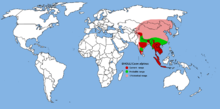Cuon
| Dhole Temporal range: 0.781–0 Ma – Recent |
|
|---|---|
 |
|
| An Ussuri dhole (Cuon alpinus alpinus). | |
| Scientific classification | |
| Kingdom: | Animalia |
| Phylum: | Chordata |
| Class: | Mammalia |
| Order: | Carnivora |
| Family: | Canidae |
| Subfamily: | Caninae |
| Genus: |
Cuon Hodgson, 1838 |
| Species: | C. alpinus |
| Binomial name | |
|
Cuon alpinus (Pallas, 1811) |
|
 |
|
| Dhole range | |
The dhole (Cuon alpinus) is a canid native to Central, South and Southeast Asia. Other English names for the species include Asiatic wild dog,Indian wild dog,whistling dog, red wolf (not to be confused with Canis rufus), red dog, and mountain wolf. It is genetically close to species within the genus Canis, though its skull is convex rather than concave in profile, it lacks a third lower molar, and the upper molars sport only a single cusp as opposed to 2–4. During the , the dhole ranged throughout Asia, Europe and North America, but became restricted to its historical range 12,000–18,000 years ago.
The dhole is a highly social animal, living in large clans without rigid dominance hierarchies and containing multiple breeding females. Such clans usually consist of 12 individuals, but groups of over 40 are known. It is a diurnal pack hunter which preferentially targets medium and large sized ungulates. In tropical forests, the dhole competes with tigers and leopards, targeting somewhat different prey species, but still with substantial dietary overlap.
It is listed as Endangered by the IUCN, as populations are decreasing and estimated at fewer than 2,500 adults. Factors contributing to this decline include habitat loss, loss of prey, competition with other species, persecution, and disease transfer from domestic dogs.
The etymology of dhole is unclear. The possible earliest written use of the word in English occurred in 1808 by soldier Thomas Williamson, who encountered the animal in Ramghur district. He stated that dhole was a common local name for the species. In 1827, Charles Hamilton Smith claimed that it was derived from a language spoken in 'various parts of the East'. Two years later, Smith connected this word with Turkish: ‘mad, crazy’, and erroneously compared the Turkish word with Old Saxon: and Dutch: (cfr. also English: ; German: ), which are in fact from the Proto-Germanic *dwalaz ‘foolish, stupid’.Richard Lydekker wrote nearly 80 years later that the word was not used by the natives living within the species' range. The Merriam-Webster Dictionary theorises that it may have come from the Kannada: tōḷa (‘wolf’).
...
Wikipedia

